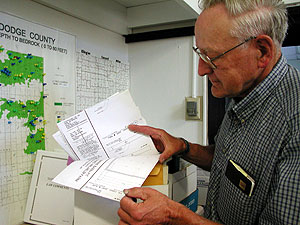|
Audio
Photos
More from MPR
Resources
Your Voice
|
New law loosens environmental rule for feedlot
June 24, 2003
A new law makes it easier to build larger feedlots in Minnesota. People who oppose such facilities and their large manure lagoons say the law strips citizens' right to have a say in the future of their community. Supporters say it will save the government time and money.
Berne, Minn. — Prior to the new law, neighbors could challenge any proposed feedlot that had more than 1000 hogs or 214 dairy cows. They would do this through a petition calling for an environmental review. The new law more than triples the number of animals before an environmental review is required.
 | |||
"I think it's a travesty. They took away our voice," says Pat Derby, a farmer from the Dodge County town of Berne.
Derby opens her refridgerator and pours herself a glass of water. She and her family have relied on bottled water since last year. That's when water tests showed abnormally high levels of harmful bacteria in their well water.
As she walks out onto her front porch, she points in the direction of her neighbors. She says their water is so contaminated, doctors told them not to use it to bathe their children. The contamination comes from fertilizer used on nearby farms which entered the water through the area's fragile geology.
The soil of Berne rests on a limestone foundation called 'karst.' Sinkholes are a common feature of karst. They are holes on the surface that can act as a conduit to the groundwater, which people use to draw their drinking water.
Now, Derby says, there's a new threat to her groundwater. An area farmer has proposed building a 2400 hog feedlot less than a mile away.
With the help of the Land Stewardship Project, 30 of Berne's 37 families formed what they call the "Berne Area Alliance for Quality Living." The group's protests led to an environmental review of the project, which in turn led to a number of environmental protection requirements being added to the permit.
Derby says she's enraged by a new state law that will take away the citizen's right to petition for environmental review of similar-sized projects.
"We were able to heighten their awareness and bring these facts to them," says Derby. "If we wouldn't have had this environmental review process, we wouldn't have been able to bring these concerns to the forefront."
Derby says the Berne Alliance has completed thousands of hours or research and submitted hundreds of documents to Dodge County, all proving the dangers of feedlots.
The man in charge of interpreting this information is Dodge County feedlot inspector Ken Folie. At his office in Mantorville, Folie goes through hundreds of documents sent to him by the Berne Alliance.
"They get a group of people together and they'll give us 80 or 100 pages and when you dig into it, there's another 100 or 200 pages, and they take each one of the concerns and contest them," says Folie.
Folie says the Berne Alliance's role in the feedlot permit process has meant more work for county officials.
He says he commonly works 14-hour days. It's been a year and a half since he's been able to take a day off.
Folie says less public involvement in this process will give county employees across the state more time to do their job. Now, he says, they'll have time to enforce environmental code by getting out of the office and conducting inspections on existing feedlots, instead of sifting through paperwork on proposed ones.
State Sen. Dallas Sams, DFL-Staples, authored the new law. He says the law will also save time and money for the state's agriculture industry.
"The problem was was that a lot of farmers were saying you know, if I'm going to have 25 people signing the petition to stop the project or slow it down and it'll cost several thousand dollars, its not worth it, we're not going to pursue it," says Sams.
Sams says although the right of the public to petition a feedlot has been taken away, the right to have an opinion heard has not. Under the new law, the county is required to conduct a public hearing for a proposed feedlot. But according to Berne farmer Pat Derby, one public hearing isn't enough.
The Dodge County Board will vote on the Berne feedlot proposal this evening. The new law that changes the requirements for an environmental review on feedlots doesn't go into effect until July 1st.
|
News Headlines
|
Related Subjects
|

